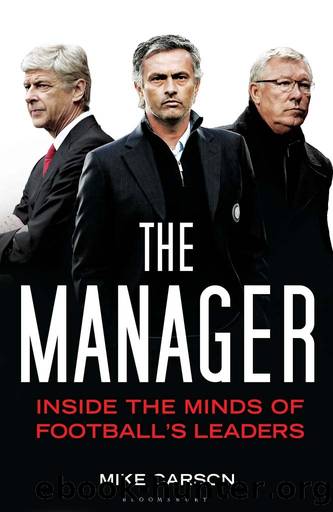The Manager by Mike Carson

Author:Mike Carson [Carson, Mike]
Language: eng
Format: epub
ISBN: 9781408841624
Publisher: Bloomsbury Publishing
The Solution: Command, Lead and Manage
Much has been written on the subject of leadership, and much debate exists around the difference between leadership and management. In England, we talk about football managers. In the rest of Europe, they more usually talk about coaches. Neither of these titles tells the full story. In reality, like most leaders, their work falls into three distinct categories, each requiring a different approach. Which approach depends on the situation in which they find themselves â and a little bit on their own natural preferences.
Leadership and management expert Professor Keith Grint of Warwick University defines these categories vividly. One approach is âcommandâ. We donât often think of leaders as commanders, except perhaps in the military. In fact, football managers quite often use command. It is the act of âtaking chargeâ and imposing a solution. It provides little or no room for discussion or disagreement, and is a sound approach in a crisis. When the going gets tough, people become worried and unsure. They look for direction â and commanders provide certainty and answers.
When the team is not in a crisis, the question then becomes: is this something weâve faced before â something to which there is a clear answer? If the answer is yes, then it will respond to well-tried methods. It is a âtameâ problem. This is âmanagementâ. The manager is about rolling-out things that have been done before, where the degree of certainty is high. The problem may feel like a puzzle â may even be quite complicated â but there is a solution, and the manager engages in a familiar process to solve it.
If it is not something we have faced before, and there might well not even be a clear answer, then weâre into âleadershipâ. Grint calls these challenges âwicked problemsâ. In football, this could be about unusual individual behaviour, about a club near to bankruptcy, about a critical injury or about facing opponents who on paper are better in every department. The leader will need to ask questions. He will often hear himself saying: âIâve never seen this problem before; I need to get people together to work out what to do.â
Mancini is a natural commander. As a player he was known for his assertiveness with his colleagues. Sven Göran Eriksson was Manciniâs coach at Sampdoria where he observed his young colleagueâs natural leadership: âHe wanted to be a manager even while he was a player. He was the coach, he was the kit man, he was the bus driver, everything. He wanted to check that everything was in place before training. Sometimes I would have to tell him: âMancio, you have a game to play on Sunday. Youâll be exhausted if you have to control everything.â But he was like that.â Perhaps the young Mancini recognised this in himself: âI thought this when I was 12 years old â that I wanted to be a manager. When I started to play football I thought I would want to be a manager.
Download
This site does not store any files on its server. We only index and link to content provided by other sites. Please contact the content providers to delete copyright contents if any and email us, we'll remove relevant links or contents immediately.
Storytelling for dummies by Andrea Fontana(1519)
Effortless by Greg McKeown(1488)
The Practice by Seth Godin(1442)
Mastering Blockchain by Lorne Lantz(1427)
Blockchain Quick Reference by Paul Valencourt & Samanyu Chopra & Brenn Hill(1180)
Business Information Systems Workshops by Unknown(979)
The wind in the willows by Kenneth Grahame(949)
Mastering Blockchain by Lorne Lantz & Daniel Cawrey(931)
How to Lead by David M. Rubenstein(860)
The Ape in the Corner Office by Richard Conniff(818)
Handbook of Big Data Analytics by Unknown(749)
Social Media Engagement For Dummies by Aliza Sherman(737)
Getting Started with Data: The first book you should read to successfully get along with data. by Menegatti Gabriel & Team Simbiose Ventures(733)
FunRetrospectives: activities and ideas for making agile retrospectives more engaging by Paulo Caroli & Tainã Caetano Coimbra(723)
Taking Care of Yourself (HBR Working Parents Series) by Harvard Business Review(723)
Evernote for Self Publishing: How to Write Your Book in Evernote from Start to Finish by Jose John(702)
Business Storytelling For Dummies by Unknown(698)
Help! My Facebook Ads Suck-- by M. D. Cooper & Jill Cooper(685)
A Leader Listens by Ajay Banga(670)
